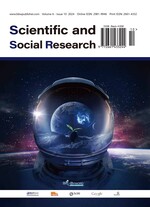Abstract
To explore the effects of coaching ability and coach-athlete interaction on the athletic performance of youth Wushu sparring athletes, this paper selected 200 youth kickboxing players from Tianjin, China as the research subjects and randomly divided them into the experimental group and the control group. The experimental group adopted the integrated training method of coaching ability improvement and interactive communication, while the control group adopted the traditional training method. The research methods included a questionnaire survey, experimental observation, and data analysis, and the training effects were compared by evaluating the athletic performance and perceived coaching ability of the athletes in the two groups before and after training. The results showed that the athletic performance of the athletes in the experimental group was significantly improved, while that of the control group was only slightly improved. In addition, the perceived coaching ability of the athletes in the experimental group was significantly improved, and the quality of coach-athlete interaction was significantly enhanced (P < 0.05). The conclusion shows that the improvement of coaching ability and good coach-athlete interaction can significantly improve athletes’ sports performance, which has a wide application prospect.
References
Xi Y, Zhang N, Yu LP, 2023, The Influence of Self-perceived Pressure and Social Support on the Mental Health of Athletes with Physical Disabilities in China. Journal of Cangzhou Teachers College, 39(01): 94–100.
Wang Y, 2023, Based on The Influence of Coaches’ Improper Leadership Behavior on Athletes’ Training Performance from the Perspective of Athletes: A Chain Intermediary Model. Journal of Capital Institute of Physical Education, 35(06): 673–679 + 687.
Tang SJ, Qin KY, Li Y, et al., 2023, Research on the Spatial Distance Perception Characteristics of Orienteers: Evidence from Ethology and fNIRS. China Sports Science and Technology, 59(03): 20–27 + 36.
